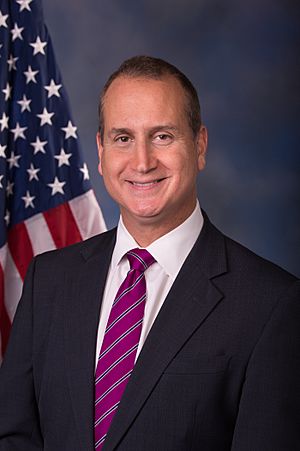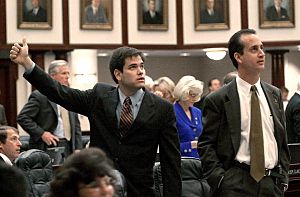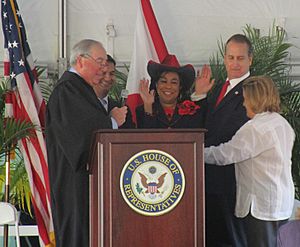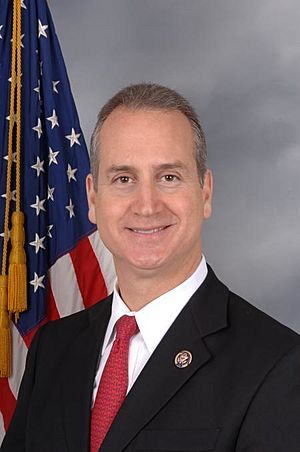Mario Díaz-Balart facts for kids
Quick facts for kids
Mario Díaz-Balart
|
|
|---|---|

Official portrait, 2017
|
|
| Member of the U.S. House of Representatives from Florida |
|
| Assumed office January 3, 2003 |
|
| Preceded by | Constituency established |
| Constituency | 25th district (2003–2011) 21st district (2011–2013) 25th district (2013–2023) 26th district (2023–present) |
| Member of the Florida House of Representatives | |
| In office November 7, 2000 – November 5, 2002 |
|
| Preceded by | J. Alex Villalobos |
| Succeeded by | Redistricted |
| Constituency | 112th |
| In office November 8, 1988 – November 3, 1992 |
|
| Preceded by | Javier Souto |
| Succeeded by | Redistricted |
| Constituency | 115th |
| Member of the Florida Senate from the 37th district |
|
| In office November 3, 1992 – November 7, 2000 |
|
| Preceded by | Redistricted |
| Succeeded by | J. Alex Villalobos |
| Personal details | |
| Born |
Mario Rafael Díaz-Balart y Caballero
September 25, 1961 Fort Lauderdale, Florida, U.S. |
| Political party | Republican (1985–present) |
| Other political affiliations |
Democratic (before 1985) |
| Spouse | Tia Diaz-Balart |
| Relations | Díaz-Balart family |
| Children | 1 |
| Parent |
|
| Relatives | Lincoln Díaz-Balart (brother) José Díaz-Balart (brother) Mirta Díaz-Balart (aunt) Waldo Díaz-Balart (uncle) Fidel Ángel Castro Díaz-Balart (cousin) |
| Education | University of South Florida (BA) |
Mario Rafael Díaz-Balart y Caballero (/bəˈlɑːrt/ BƏ-lart; born September 25, 1961) is an American politician serving as the U.S. representative for Florida's 26th congressional district. A member of the Republican Party, he was elected in 2002, and his district includes much of northwestern Miami-Dade County, including Hialeah, and much of the northern portion of the Everglades.
After Representative Alcee Hastings's death in April 2021, Díaz-Balart became the dean (or longest-serving member) of Florida's congressional delegation.
Contents
Early life, education, and early political career
Díaz-Balart was born in 1961 in Fort Lauderdale, to Cuban parents, the late Cuban politician Rafael Díaz-Balart, and his wife, Hilda Caballero Brunet.
He is a member of the Díaz-Balart family: His aunt, Mirta Díaz-Balart, was the first wife of Cuban president Fidel Castro. Her son, and his cousin, was Fidel Ángel "Fidelito" Castro Díaz-Balart. His uncle is the Cuban-Spanish painter Waldo Díaz-Balart. His brother Lincoln Díaz-Balart represented Florida's 21st District from 1993 to 2011. He has two other brothers, José Díaz-Balart, a journalist, and Rafael Díaz-Balart, a banker.
He studied political science at the University of South Florida before beginning his public service career as an aide to then-Miami Mayor Xavier Suárez in 1985. In the same year, he changed his political party affiliation from Democratic to Republican.
Florida legislature

Díaz-Balart was elected to the Florida House in 1988 and to the Florida Senate in 1992. He returned to the Florida House in 2000.
U.S. House of Representatives

Elections
- 2002–2006
Díaz-Balart gave up his seat in the state house to run in the newly created 25th District, which included most of western Miami-Dade County, part of Collier County and the mainland portion of Monroe County. He won with 64% of the vote. He was unopposed for reelection in 2004, and won a third term with 58% of the vote in 2006.
- 2008
In 2008, Díaz-Balart faced his strongest challenge to date in Joe García, former executive director of the Cuban American National Foundation and former chairman of the Miami-Dade County Democratic Party. Díaz-Balart defeated Garcia with 53% of the vote.
- 2010
On February 11, 2010, Díaz-Balart announced his intention to seek election in Florida's 21st congressional district—being vacated by his brother, Lincoln Díaz-Balart—rather than the 25th district. Unlike the 25th, the 21st has long been considered the Miami area's most Republican district. No other party even fielded a candidate when filing closed on April 30, handing Díaz-Balart the seat.
- 2012
Díaz-Balart was reelected unopposed in 2012 in the renumbered 25th district.
- 2014
In 2014, Díaz-Balart ran unopposed.
- 2016
In 2016, Díaz-Balart beat Democrat Alina Valdes, 62.4% to 37.6%. It was only the third time that a Democrat had filed to run in this district, which had been numbered as the 21st from 1993 to 2013.
- 2018
The Miami Herald reported in April 2018 that Díaz-Balart seemed a shoo-in for reelection in November. Former Hialeah mayor Raúl Martínez, a Democrat who had challenged Lincoln Díaz-Balart in what was the 21st in 2008, said the 25th district "is very hard to win for a Democrat, especially if you're not Hispanic and you don't speak Spanish." Valdes, who had lost to him in 2016, was a candidate in the Democratic primary. In April, Annisa Karim, who is active in the Democratic Party, announced that she too would run in the primary. In May, the Herald reported that Mary Barzee Flores, a former judge who had at first decided to run in the 27th district, had opted instead to run for Díaz-Balart's seat.
In the November 2018 general election, Díaz-Balart defeated Barzee Flores, 60.5% to 39.5%.
Committee assignments
For the 118th Congress:
- Committee on Appropriations
- Subcommittee on Defense
- Subcommittee on State, Foreign Operations, and Related Programs (Chair)
- Subcommittee on Transportation, Housing and Urban Development, and Related Agencies
Caucus memberships
- Chair of the Congressional Hispanic Conference
- Founder of the Protecting Families Online Initiative
- Founding member of the Washington Waste Watchers
- Member of the Congressional Cuba Democracy Caucus
- Republican Main Street Partnership
- House Baltic Caucus
- Republican Governance Group
Political positions
As of January 2018, Díaz-Balart had voted with his party in 92.4% of votes in the 115th United States Congress and voted in line with President Trump's position in 93.1% of votes.
He is a founding member of the Congressional Hispanic Conference, a caucus of Hispanic Republican congressmen.
In May 2019, Díaz-Balart voted to prohibit discrimination on the basis of sexual orientation and gender identity in employment, housing, public accommodations, public education, federal funding, credit, and the jury system under the Equality Act. He joined seven other Republicans and 228 Democrats in supporting the legislation, which passed the United States House of Representatives during the 116th Congress.
Díaz-Balart opposes an income tax increase, opposes federal spending as a means of promoting economic growth, supports lowering taxes as a means of promoting economic growth, opposes requiring states to adopt federal education standards, supports building the Keystone Pipeline, supports government funding for the development of renewable energy, opposes the federal regulation of greenhouse gas emissions, opposes gun-control legislation, supports repealing the Affordable Care Act, opposes requiring immigrants who are unlawfully present to return to their country of origin before they are eligible for citizenship, opposes same-sex marriage, and supports allowing individuals to divert a portion of their Social Security taxes into personal retirement accounts.
On May 4, 2017, Díaz-Balart voted to repeal the Patient Protection and Affordable Care Act (Obamacare) and pass the American Health Care Act.
Díaz-Balart voted to promote free trade with Peru, against assisting workers who lose jobs due to globalization, for the Central America Free Trade Agreement, for the US-Australia Free Trade Agreement, for the US-Singapore free trade agreement, and for free trade with Chile.
Díaz-Balart voted for the Tax Cuts and Jobs Act of 2017. The Center for American Progress, a center-left think-tank, estimated that 41,000 of his constituents would lose their health insurance as a result of the bill's passing.
Díaz-Balart supported Trump's 2017 executive order to impose a temporary ban on entry to the U.S. to citizens of seven Muslim-majority countries, saying, "The ban is only temporary until the administration can review and enact the necessary procedures to vet immigrants from these countries. The ban is based on countries the Obama administration identified as 'countries of concern' and not based on a religious test."
Personal life
Díaz-Balart lives in Miami with his wife, Tia, and their son, Cristian Rafael.
On March 18, 2020, Díaz-Balart announced he had tested positive for COVID-19. He was the first member of Congress to do so. While recovering from the effects of the disease, though still drained from the experience, Diaz-Balart said he would offer his blood plasma, with antibodies against the virus, for experimental treatment or research purposes.
Díaz-Balart is Roman Catholic.
See also
 In Spanish: Mario Díaz-Balart para niños
In Spanish: Mario Díaz-Balart para niños



